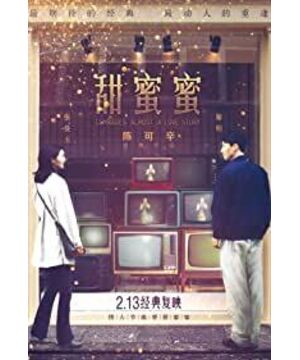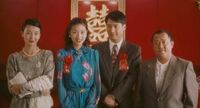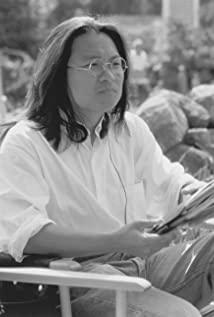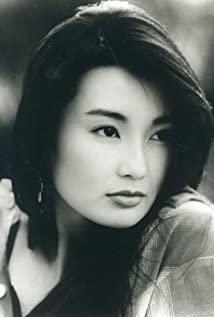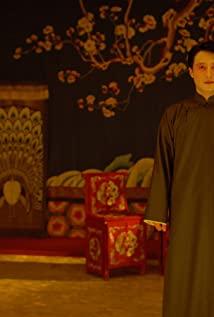The Hong Kong film market in 1996 was dominated by the young and the bewildered. "Sweet Honey" appeared at the end of the year to dilute the former's violent atmosphere, and finally won nine awards at the 16th Hong Kong Film Awards, and also took home the 1997 The Hong Kong Film Critics Society Awards and the Hong Kong Golden Bauhinia Awards have won a number of awards. Looking back on the Hong Kong movies in those years, among the works that have been precipitated by time, the film works of the UFO company that produced "Sweet Honey" accounted for the majority. These films have changed from the 1980s. Its characteristics and style are warm, it is the standard of Hong Kong movies in this period, and "Sweet Honey" is almost the most familiar work of UFO.
Understanding the experience of the film's director, Chen Kexin, will help to better understand the film. Chen Kexin was born in Hong Kong. He moved to Thailand with his family when he was young. He studied film in the United States. After returning to Hong Kong in the 1980s, he entered the film industry and established a filmmaker production company (UFO) with Zeng Zhiwei, Zhong Zhen, Li Zhiyi, Zhang Zhiliang, Ruan Shisheng, etc. He has directed and produced many influential works, such as "Three Heroes" (1993, co-directed with Li Zhiyi), "New Difficult Brothers and Difficulties" (1993, co-directed with Li Zhiyi), "Golden Branches and Jade Leaves" (1994), "Mammy Fanfan" (1996), "Sweet Honey" (1996). After 1998, Chen Kexin moved to Hollywood and directed "Love Letter" for Spielberg's DreamWorks. Two years later, he returned to Hong Kong and tried to cooperate with Asian filmmakers. He cooperated with filmmakers in Thailand, Japan, South Korea and other films such as "Three Watches" and "Damn". After 2005, Chen Kexin followed the trend of the Hong Kong film "Looking at Shenzhou from the North", and directed films such as "If Love" (2005) and "Famous Name" (2007) in China. It is worth mentioning that the two films "Golden Rooster" (2002) and "Chuntian Huahua Alumni Association" (2006), which he participated in the production of, also bear Chen Kexin's personal mark. Throughout Chen Kexin's experience and most of his works, he has shown a deep attachment to Hong Kong but a "flexible" attitude from time to time, and this is exactly what happens to many characters in "Sweet Honey" when they face personal reunion and the turbulent times. life beliefs.
Putting "Sweet Honey" in the silent world of Hong Kong movies at that time and the major historical events that are about to return, you will find that this film carries more than just the joys and sorrows of a pair of mainland immigrants. Unlike the nostalgic films such as "92 Black Roses vs Black Roses" (1992), the film's retrospective sentiment towards Hong Kong is not a postmodern parody of a once mass pop culture phenomenon, but the history behind the love story. emotion.
The stories of Lai Xiaojun and Li Qiao reflect the social changes in Hong Kong from the 1980s to the 1990s. These two new immigrants, whether they came from Guangzhou, which has the same language and culture as Hong Kong, or Tianjin, which is more heterogeneous, are Hong Kong's "others" to the mainland at the beginning of reform and opening up. Hong Kong represents wealth, modernity, and opportunity. It is a place where these new immigrants think they can change their lives, but when they really enter the city, they face the difficulties of integration and the struggle to survive. In particular, Li Qiao, who thinks that the difference with Hong Kong is only in his identity, seems to be well versed in the survival principles of this capital of opportunity, but he also has several ups and downs in the speculative risks that go hand in hand. However, Li Xiaojun, who knew almost nothing about Hong Kong before, achieved a stable life by sticking to his duty due to his attitude of "doing nothing wins". This is rather a deep understanding of Hong Kong by the creators of the film. Hong Kong is always too legendary from the eyes of others. In fact, it is both rich and cruel, inclusive and exclusive. It is a city full of dreams and shatters. A sense of longing and pressure. Li Xiaojun and Li Qiao thought that Hong Kong would be "my city", but they guessed it was just a "floating city". After entering the 1990s, the attractiveness of Hong Kong as a role model in Asia gradually disappeared. The mainland rose rapidly due to reform and opening up, and other neighboring countries and regions were also flourishing. Therefore, in the film, Hong Kong is no longer a place of death, it is just a springboard. Among the people who have left, there are new immigrants like Li Xiaojun and Li Qiao who have been in Hong Kong for less than ten years, and native Hong Kongers like Leopard Brother. There are guests from all over the world like "Zhai Luwei" and Kai Lan who came to Hong Kong to wander or look for opportunities to make money, and even aunts who passed away with a dream. Outside the film, there are also filmmakers like Chen Kexin... But, without exception, Hong Kong is a city that they will never forget in their lifetimes. They have given or gained their youth, dreams, love, success, and failure here, and finally know their hearts. , and even complete the bar mitzvah.
The earlier historical memory of Hong Kong is hidden in the love of Aunt Lai Xiaojun. Aunt's love traces the history of Hong Kong back to the 1950s and 1960s. The film chose William Holden not only because he was a very influential Hollywood star in that era, but he came to Hong Kong in 1960 to shoot the film "The World of Suzie Wong", which was once a classic Hong Kong imagination in the Western world. . The so-called "Su Si Huang's World" refers to the fact that during the Korean War and the Vietnam War, many Western warships were suspended in Hong Kong, and sailors mostly spent time in bars in Wanchai. Su Si Huang represented the bar girl. During the day, she imagined that she was a wealthy girl to be married; at night, she was a charming girl. In the film, a man from the western world is tired of a boring life and comes to Hong Kong to find inspiration for painting. On the Star Ferry, he meets Su Si Huang, a woman from a bar in Wan Chai, and finally achieves a beautiful legend of love between the East and the West. Like Madam Butterfly and Miss Saigon, Susie Wong is one of the charming oriental sentiments in the eyes of Westerners, with long hair, cheongsam, petite, charming, no regrets about love, and the 1960 Star Ferry, Central, Wan Chai , typhoon shelter, together constitute the "code" of Hong Kong. But for Hong Kong, the role of "Su Si Huang" is tragic. In "Sweet Honey", the love between "Zhai Luwei" and the Thai prostitute Kai Lan is still a modern version of the exotic love between the East and the West. Hong Kong, which is full of eclectic and worldly pleasures, bears the testimony of this ultra-classical love. Like Brother Leopard's memories of Yau Ma Tei, he mentioned tea restaurants, herbal tea shops, narrow streets and small shops, which is also a high-level summary of Hong Kong's market life. Brother Leopard, the supporting role who failed to perform adequately in this film, was promoted to the protagonist in UFO's "Half Cigarette" in 1999. The few words here spread out into another reminiscence of Hong Kong.
It is worth mentioning that the film not only won the local audience, it also won the 34th Taiwan Golden Horse Awards for Best Feature Film and Best Actress. Teresa Teng's singing voice was familiar to Chinese all over the world. Choosing her means choosing a memory in the hearts of many Chinese people, and the style, content and even the singing process of her songs will remind people of a great era of separation and wandering. No matter where they are scattered, the immutable cultural genes will make the Chinese choose Teresa Teng together, and this film also surpasses Hong Kong and has the possibility of further explanation.
In addition to the connotation of the film, the film also has many points of note in terms of artistic techniques, especially the technique of "grass snakes and gray lines, and the pulse is thousands of miles", which makes the film fun to watch repeatedly. The McDonald's in the film, the bracelet, the Mickey Mouse tattooed on Brother Leopard's back, and his gold watch are all used for comparison. Even Li Qiao's eating appearance has become a magic stroke in shaping the characters. At the press conference of the real estate project in the middle of the film, Li Qiao used several close-ups to make a deep impression. She and Li Xiaojun recounted the proud situation after parting, and were happy to achieve the purpose of coming to Hong Kong, but the death of her mother made her successful. It doesn't seem to make sense anymore, what's more, she also gave up her relationship with Li Xiaojun. While Li Qiao was talking, she had been eating a lot. She interpreted this as being busy, but it was actually a cover-up for Li Xiaojun, and it was also a hint of Li Qiao's background and personality: she came from a slightly cold background and always had an instinctive appetite for food. and inelegant eating. But it was this way that gave her tenacious vitality. In the streetside buildings in New York, she also ate the takeaway chicken that Leopard Brother brought back (she didn't know that it was precisely what Li Xiaojun did), and she only used her spare time. A few free strokes will plump up Li Qiao's image. Regarding Li Qiao's eating, there are two more parts in the film. One is about giving Li Xiaojun the leftover wontons to eat, and the other is eating the chocolate that was melted by Li Xiaojun's butt on the night when he was queuing up to buy stocks. Self-explanatory.
In addition to making good use of foreshadowing, the film also does not forget to focus on the supporting characters, so as to create a lifelike appearance of all beings in the era, making this film a masterpiece. Brother Leopard is naturally an impressive supporting role in the film. He and "Zhai Luwei" and the charterer who takes good care of his aunt are also affectionate people. Even the inconspicuous little character in the film - the boss who hired Li Xiaojun, It also used a detail to show the true character of its loyal elders. For example, Li Xiaojun stole the chicken feet from the store and cooked it for Li Qiao, who was a massage girl. The boss obviously found out, but he didn't seem to know the simple arithmetic of how many chickens should be how many feet. Later, Li Xiaojun told the truth that the two often faked losing when they played, reflecting the warmth of human affection. There are a lot of songs like this in the film, and it is worth experiencing and interpreting again and again.
The language of the shots in this film is plain, and the ups and downs of the characters' emotions are mostly described with a contemplative attitude. For example, Li Xiaojun and Li Qiao had a sudden change in their relationship, and the process was very vivid and natural. They first ate wontons together. Li Xiaojun talked about his past with Xiaoting while eating, and Li Qiao also listened while eating with an ordinary attitude. After eating, the two washed the dishes together. The camera alternately showed their hand movements and facial expressions. Both of them seemed to be calm on their faces, but their hands were carefully avoided between the small pools, and Li Xiaojun gave them a towel. Li Qiao wiped her hands, but her hand movements and facial expressions were clearly hesitant and hopeful. Then Li Qiao proposed to go home. Li Xiaojun put on his jacket thoughtfully for Li Qiao, buttoned the buttons awkwardly, and the two were invisibly close. Li Xiaojun added his rustic blue jacket to Li Qiao thoughtfully. People try to control their inner emotions. In the end, Li Qiao's hair touched Li Xiaojun's eyes, Li Qiao gently brushed her hair, Li Xiaojun helped her brush her hair behind her ears, and continued to button the last button, Li Qiao leaned on Li Xiaojun's shoulder hesitantly , finally embraced and kissed irresistibly... The clip of less than three minutes expresses the very complex emotions of the two people, intimacy and depression. There is very little dialogue in the whole scene, and it is basically expressed in the body language of the actors. Sophisticated technique. The same technique appeared in the section "Brother Leopard Sudden Death". Brother Leopard, who once traversed the rivers and lakes, was killed unsuspectingly by the guns of street gangsters who did not talk about the morality of the rivers and lakes. This itself has a destiny. A group of onlookers quickly gathered outside the laundromat. Li Qiao was still unaware in the laundromat, and even stood outside the laundromat waiting for Brother Leopard. She didn't see her shocked expression until she inadvertently joined the crowd. The next scene quickly turned to the scene where Li Qiao was in the hospital watching Brother Leopard carrying Mickey Mouse on his back, and there was no dialogue. The death of life should not be expressed in extremely restrained camera language, only in this way can fully express the impermanence of fate. In the film, only Li Xiaojun and Li Qiao meet at the end, and an obvious parallel editing is adopted to form a strong hint and guidance for the audience. On the camera, the two are walking across from each other, Li Xiaojun to the left and Li Qiao to the right, because they have already missed it once at the pier and once on the street. Will they miss it this time? Of course, miracles still happened.
It is worth mentioning that, compared with other works of UFO Company, "Sweet Honey" is not only the most popular and well-known in terms of expression techniques and story settings, but also in the mixed cultural environment of Chinese and Western, depicting the life at the bottom of the city, between material desires and human desires. Contradictions and compromises, the warmth of mutual affection between people, the villain without masking, etc., are also "The Three Heroes" (1993), "New Difficult Brothers and Difficulties" (1993), "Rogue Doctor" (1995), An important factor in UFO business cards such as "Savior" (1995). For example, Li Qiao's choice of Li Xiaojun or Leopard is actually a choice between bread and love, but the film does not emphasize love and despise material things as it does in ordinary melodramas. Emotions are not necessarily entirely morally inferior. When Li Xiaojun was about to immigrate to New York, he said to Xiaoting: "I'm leaving tomorrow, I'm a little scared to fly for the first time... I'm not a brave man. I dare not ask you to forgive me, I just think, We have been together for so many years, and we have traveled such a long way, Xiaoting, I am also sad." Hearing these words, the audience will have understanding and sympathy for this traditional senseless person. The difficult adaptation process after loneliness turned his emotional balance in favor of Li Qiao. In fact, whether it is Li Xiaojun, who is pure and responsible, Li Qiao, who is shrewd and realistic, or even the once-famous Leopard Brother, all of them have tolerated the incompleteness of their feelings more or less, and this is the normal state of life. Of course, due to commercial pressure, whether it is "Sweet Honey" or other UFO films, the plot advancement often relies on coincidences or miracles, maintaining a warm and evasive attitude towards reality and history, which has become its weakest link. However, looking at the real environment of Hong Kong films in business, UFO's efforts and compromises are worthy of our deep respect.
View more about Comrades, Almost a Love Story reviews


